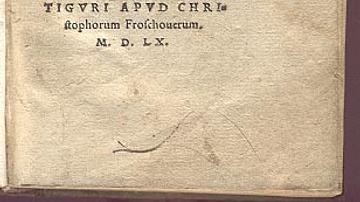
Roman invective (uituperatio lat.) was the rhetorical and literary genre that aimed at systematically and publicly blaming a political foe to set him aside from the whole community and turn the audience against him during judicial, forensic and deliberative speeches delivered in a judicial prosecution, in the Roman Senate or the popular assembly (contio). Consequently, Roman invective, which could be expressed through speeches, poems, epigrams, essays, political pamphlets etc., is therefore closely related to the modern notion of “character assassination”. None of the existing Roman laws forbade the use of invective, and thus it gradually became a staple part of Roman political life. Legitimate grounds for attack could include references to a person's habits, physique, birth, clothes and perceived moral defects.
Many speeches which included invectives were no-holds-barred verbal fights without limit except the orator's imagination. Ad hominem attacks were regarded as a legitimate way to convince the audience and reach political goals. Invective harmed the opponent while enhancing the orator's own position, indirectly creating an ideal model by deeming anything or anyone outside this model as damaging or threatening, and then acting as a social regulator.
By approving the praiseworthy elements and expelling the deviant elements of Roman society, praise and blame shaped the Roman identity by attributing virtues and vices. The essentially Ciceronian nature of the preserved evidence gave birth to many studies that considerably improved the understanding of the mechanisms of blame during the Roman Republic. Nevertheless, the analysis of Roman invective has often been confined to the Ciceronian corpus and to the surviving speeches delivered as a direct attack against an opponent, leaving aside other relevant material. According to a broader definition, invectives could be only parts of orations, as well as insults and slanders outside a strictly oratorical context.
Cicero
Cicero (106-43 BCE), the Roman senator, orator and statesman wrote rhetorical treatises (De Inventione 2.177-178 and Part. Or. 82) and the so-called Rhetorica ad Herennium (3.10-15) which codified the uituperatio as belonging to the epideictic oratory (genus demonstratiuum) alongside its counterpart praise (laus). These treatises identified three main categories of invectives:
- external circumstances (res extraneae) which include birth, education, wealth, power, achievements and citizenship.
- physical attributes (res corporis) such as looks, health, speed, strength and weakness.
- qualities of character (res animi) such as wisdom, justice, courage and self-restraint.

An encompassing view of Cicero's oratorical speeches give more precise lists of loci although a canonical list does not exist: degrading family origins; an unworthy relative; disgusting physical appearance; eccentric or alien dress; gluttony; drunkenness; sexually deviant behaviour; luxury; oratorical ineptitude; avarice; cupidity; corruption; squandering one's patrimony; plunder of private and public property; financial embarrassment; hypocrisy; cowardice; arrogance; impiety; violence; cruelty; and last but not least, aspiring to tyranny to which the locus of cruelty (crudelitas) is closely related. The accusation of aspiring to tyranny was one of the most commonly used invectives due to the underlying image of the Greek tyrants and Hellenistic monarchs and to the Roman deep-rooted hatred for kingship (odium regni) emerging from the expulsion of Tarquin the Proud in 510 / 509 BCE.
This last common invective is related to the recurring mechanism of peccatorum comparatio, consisting of assimilating the target of the invective to a disreputable historical character. It was very efficient in a society where learning the historical exempla played an important role in the education of its members. These exempla formed an anthology gathering the worthiest and most illustrious Roman citizens and leaders of the past, which every citizen, at least those from the aristocratic Roman families, must have been aware of. The violations of the traditions of these prestigious ancestors (mos maiorum) were considered as a threat to the society. Consequently, these historical exempla were often used as tools for praise and blame.
During the Roman Republic, uituperatio aimed at denying political rivals all qualities and elite values needed for being a worthy citizen, for preserving an aristocratic status and reaching the highest political offices. It is the reason why Roman invective reflected the ethical and social preconceptions of that time. Thus, a close look at the invectives might provide an insight into Roman social and political habits. These above mentioned qualities were Roman manliness (uirtus), bravery (fortitudo), respect for the gods and the ancestors (pietas), seriousness and dignity (grauitas), moral standing (pudor), appropriate sexual behaviour (pudicitas), prestigious familial origins (nobilitas), high oratorical and political skills, and most of all, the concern for the well-being of the Roman State and for the traditional ancestors' customs, habits and institutions (mos maiorum). To complete this quick list, dignitas must be added. This Roman concept, hard to translate, refers to the amount of personal reputation, influence and prestige acquired throughout the whole activity of a citizen.
During the political troubles and civil wars of the Late Roman Republic, the increasing political violence among the Roman elites and leaders intensified the use of uituperatio for blaming a foe, accusing him of tyranny and considering him as a threat to the safety of the res publica. In some cases, the target of the invective could be declared enemy of the Roman State (hostis publicus). For example, Cicero used blame on many occasions against his rivals such as Piso, in his In Pisonem, Verres in the Verrine Orations, Catilina in the Catilinarian Orations and Mark Antony in the Philippics. The increasing virulence of the Ciceronian invective, that reached its peak in the Philippics, foretold the ensuing use of uituperatio as a propagandistic tool by the military leaders of the last Roman civil wars, especially by Octavian and Mark Antony after the Julius Caesar's death in 44 BCE.






